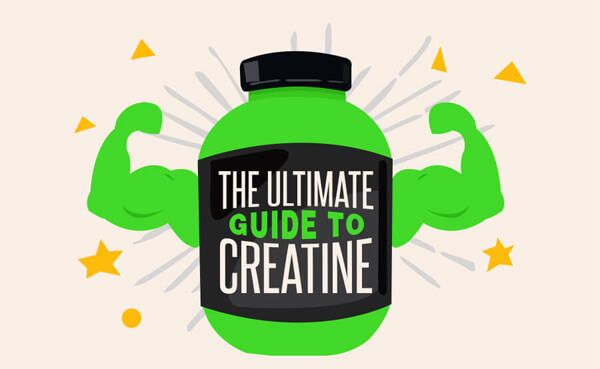The Ultimate Guide To Creatine: Uses, Dosage, And Safety

Table of Contents
Understanding Creatine: What It Is and How It Works
Creatine is a naturally occurring organic acid found primarily in skeletal muscle. Its chemical structure is relatively simple, and the body naturally produces a small amount, with additional creatine obtained from dietary sources like red meat and fish. Creatine's primary role is in energy production within muscle cells. Specifically, it plays a crucial part in the ATP-PC system (adenosine triphosphate – phosphocreatine system), the primary energy source for short bursts of high-intensity exercise.
- Creatine Phosphate (Phosphocreatine): Creatine is stored in muscles as phosphocreatine. This molecule acts as a readily available reservoir of phosphate, crucial for rapidly regenerating ATP (adenosine triphosphate), the body's primary energy currency.
- ATP Resynthesis: During high-intensity activities, ATP is broken down to release energy. Creatine phosphate quickly donates its phosphate group to ADP (adenosine diphosphate), converting it back into ATP. This rapid ATP resynthesis is what allows for powerful muscle contractions during short, intense efforts.
- Muscle Energy and Creatine Supplementation: Creatine supplementation increases the total amount of creatine and phosphocreatine stored in muscles. This leads to a greater capacity for ATP resynthesis, allowing for more intense and prolonged high-intensity exercise before muscle fatigue sets in.
The Benefits of Creatine Supplementation: Uses and Applications
Creatine supplementation has been extensively studied, revealing its wide-ranging benefits across various areas of health and fitness.
Enhanced Muscle Growth and Strength
Creatine's effect on muscle growth (hypertrophy) and strength gains is well-documented. It promotes muscle protein synthesis, the process by which muscle cells build new proteins and increase in size.
- Muscle Protein Synthesis: Creatine supplementation leads to increased levels of anabolic hormones, such as insulin-like growth factor-1 (IGF-1), which further stimulates muscle protein synthesis.
- Strength Training and Bodybuilding: Numerous studies demonstrate that creatine significantly enhances strength gains in individuals engaged in strength training, including bodybuilders and powerlifters. It facilitates greater training volume and intensity.
- Evidence-Based Research: A meta-analysis of numerous studies showed a significant increase in both lean body mass and strength in individuals supplementing with creatine.
Improved Athletic Performance
Creatine supplementation is particularly beneficial for athletes and individuals engaging in high-intensity activities. The increased availability of ATP enhances performance in various ways.
- High-Intensity Exercise: Creatine improves performance in activities lasting up to 30 seconds, such as sprinting, weightlifting, and high-intensity interval training (HIIT).
- Sprint Performance and Power Output: Studies have consistently shown improvements in sprint times, power output, and overall performance in various sports, from track and field to weightlifting.
- Improved Training Capacity: By reducing muscle fatigue, creatine allows athletes to train harder and longer, leading to further adaptations and improvements in performance.
Cognitive Function and Brain Health
While research is ongoing, some studies suggest that creatine may also offer cognitive benefits.
- Neuroprotection: Creatine may act as a neuroprotective agent, potentially reducing the risk of brain damage from injury or disease.
- Cognitive Enhancement: Some studies suggest that creatine supplementation may improve memory and other cognitive functions, particularly in individuals with certain neurological conditions.
- Further Research Needed: More extensive research is needed to definitively establish the cognitive benefits of creatine supplementation.
Creatine Dosage and Supplementation Strategies
Optimal creatine supplementation involves a loading phase followed by a maintenance phase.
- Loading Phase: Consume 20 grams of creatine monohydrate per day, divided into four 5-gram doses, for 5-7 days. This rapidly saturates muscle creatine stores.
- Maintenance Phase: After the loading phase, switch to a maintenance dose of 3-5 grams per day to maintain muscle creatine levels.
- Creatine Monohydrate: Creatine monohydrate remains the most researched and effective form of creatine. While other forms exist (HCL, ethyl ester), their superiority over monohydrate lacks robust scientific evidence.
- Consistency is Key: Consistent daily supplementation is crucial for maintaining elevated muscle creatine levels and realizing the full benefits.
- Creatine Cycling: While some advocate for cycling creatine (periods of supplementation followed by periods of discontinuation), research doesn't support significant benefits over continuous supplementation.
Creatine Safety and Side Effects
Creatine monohydrate is generally considered safe when used as directed. However, potential side effects can occur.
- Water Retention: Creatine can cause temporary water retention, leading to slight weight gain.
- Stomach Cramps: Some individuals experience mild gastrointestinal discomfort, such as stomach cramps or diarrhea, especially during the loading phase.
- Kidney Health: While rare, individuals with pre-existing kidney problems should avoid creatine supplementation. Consult a doctor before use.
- Pregnant and Breastfeeding Women: Creatine is not recommended for pregnant or breastfeeding women.
- Consulting a Healthcare Professional: Always consult with a healthcare professional before starting any new supplement regimen, including creatine.
Conclusion: Making Informed Decisions About Creatine
Creatine supplementation, when used responsibly and correctly, offers a compelling array of benefits for enhancing muscle growth, strength, and athletic performance. By understanding the optimal dosage, potential side effects, and safety considerations, you can make informed decisions about incorporating creatine into your fitness routine. Remember that consistent creatine monohydrate usage, combined with a well-structured training program and balanced diet, can significantly contribute to your fitness goals. Learn more about creatine and how it can help you achieve your fitness goals. Start your creatine journey today!

Featured Posts
-
 Analyzing Trumps Middle East Policy The May 15 2025 Trip In Context
May 17, 2025
Analyzing Trumps Middle East Policy The May 15 2025 Trip In Context
May 17, 2025 -
 Thibodeaus Papal Pun A Deeper Look At The Knicks Coaching Dynamics
May 17, 2025
Thibodeaus Papal Pun A Deeper Look At The Knicks Coaching Dynamics
May 17, 2025 -
 Impact Of Us Tariffs On Honda Production Opportunities For Canadian Exports
May 17, 2025
Impact Of Us Tariffs On Honda Production Opportunities For Canadian Exports
May 17, 2025 -
 How Tom Thibodeaus Adjustments Reshaped The New York Knicks Season
May 17, 2025
How Tom Thibodeaus Adjustments Reshaped The New York Knicks Season
May 17, 2025 -
 Knicks Face A Difficult Decision What To Do With Landry Shamet
May 17, 2025
Knicks Face A Difficult Decision What To Do With Landry Shamet
May 17, 2025
Latest Posts
-
 Josh Harts Wife On Jaylen Browns Crucial Game 5 Plays
May 17, 2025
Josh Harts Wife On Jaylen Browns Crucial Game 5 Plays
May 17, 2025 -
 Seattle Mariners Vs Detroit Tigers Key Injuries And Series Outlook March 31 April 2
May 17, 2025
Seattle Mariners Vs Detroit Tigers Key Injuries And Series Outlook March 31 April 2
May 17, 2025 -
 2024 25 High School Confidential Key Events Of Week 26
May 17, 2025
2024 25 High School Confidential Key Events Of Week 26
May 17, 2025 -
 Josh Harts Wife Reacts To Jaylen Browns Game 5 Performance
May 17, 2025
Josh Harts Wife Reacts To Jaylen Browns Game 5 Performance
May 17, 2025 -
 Mariners Vs Tigers Injured List Update For Opening Series March 31 April 2
May 17, 2025
Mariners Vs Tigers Injured List Update For Opening Series March 31 April 2
May 17, 2025
